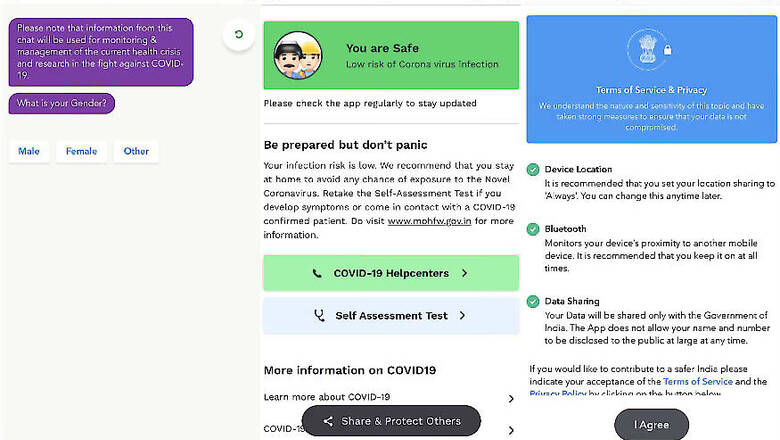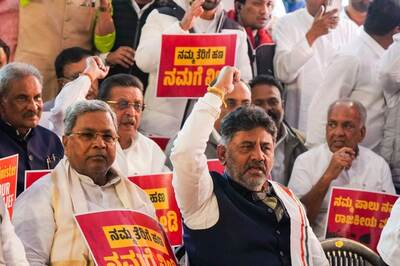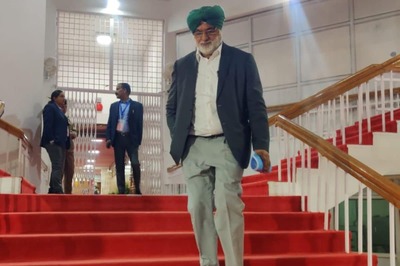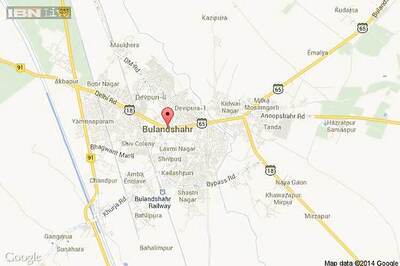
views
As the world is faced with one of the largest in terms of scale, and fast spreading pandemics, the floor is now active with questions on how to effectively combat the virus with the aid of data. This pandemic has opened our eyes to look at how woefully inadequate our data sharing frameworks are, and the need to leverage the benefits of data effectively. Successful containment will rely on early recognition of sustained human-to-human transmission which requires a system for outbreak detection, rapid data collection, analysis, assessment and timely reporting. This is crucial to rapidly implement measures to stop the pandemic at its source and to prevent deaths, social disruption, unnatural burden to the healthcare system, and economic loss. With the aid of the technology available today, it is possible to process tonnes of data across different parts of the world to identify outbreaks and use machine learning models to predict the future movement of the virus.
The International Health Regulations, 2005 (“IHR”) is the international legal framework for public health actions of WHO and all of its Member States to prevent, control and respond to the international spread of disease. The IHR also contains functions for WHO concerning international surveillance, assessment and public health response. Standardized and coordinated international information sharing is crucial for crisis management at global and national levels. National authorities will need to know how the pandemic is evolving not only in their own country, but also in neighbouring countries and continents. Free flow of information that is updated real time will allow for forming a steady global picture.
In forming healthcare interventions during pandemics, it is important to rely on raw and analysed data. Other research findings also become critical in developing a rapid and effective public health response. Data sharing frameworks facilitate an ecosystem that allows for free flow of data. Aggregated health datasets from across the world can be useful in research and help in understanding the clinical, epidemiologic, and molecular features of an infectious disease. Failure to share information in a timely manner can have disastrous public health consequences, leading to unnecessary suffering and death. At the Global and National level, data sharing has its own set of advantages.
Data sharing at the National Level
From the information currently available, we can see that the rate of transmission of Covid-19 virus is high. In an Indian context, it is important to proactively tackle the virus at the earliest to avoid the increased burden on the healthcare system. As of 24th march, Prime Minister Narendra Modi has announced a state of lockdown and has advised social distancing to prevent further spread of the virus. Now, it is important to map out at risk individuals, and use technology to isolate them. Constant monitoring is vital to prevent the explosion of this pandemic.
An interesting case study is that of Taiwan, in this regard. Taiwan used a big data approach to healthcare. They linked medical records on the National Health Insurance database with customs and immigration records to identify and test people with travel history from China, and sought medical care, or showed signs of severe respiratory illness. To deploy AI solutions, the data sets must be standardised. We see that in most healthcare systems across India, data collection and maintenance of datasets are often not uniform. This is an opportunity to begin standardising these data sets, and foster interoperability between government bodies.
Closer to home, the Arogya Setu app, developed by the National Informatics Center is a positive step. The Arogya Setu app tracks the community transmission and traces the contact and travel history of individuals that are quarantined, infected or suspected of infection. It uses a combination of location data and Bluetooth-based proximity tracking on the app users' phones, to keep a track of individuals that may have either been carriers or been affected by it. If a person who has the app eventually tests positive, an advisory is sent out to everyone who was within a close radius with the infected person in the last 14 days. They are to get tested, or self quarantine as precaution. Similar apps have been designed in Ireland and Singapore to study the movement of the virus and control the spread through information dissemination to the citizens.
While looking at sharing of data through these apps, a balance must be struck between confidentiality of information of the individual, privacy and data protection concerns, and benefit for the community at large. Reidentification of individuals can lead to significant harms. To this extent, the proportionality and necessity doctrine as enshrined by the Supreme Court in the privacy judgement must be adhered to. This is why India needs a data protection law now, more than ever, as it will ensure that private data is protected while the state is able to process data to combat health emergencies. The law is critical to strike this balance, which is the need of the hour.
Only the amount of data that is required for purposes of public health interventions must be collected. Once, the purpose is met, the data must be deleted to protect the privacy of the individual. The privacy policy of Aarogya Setu app states that the personal information it collects will only be shared with the Government of India, and it will not be disclosed to the “public at large at any time”. It also mentions that the data will be shared with the Government as “anonymized, aggregated datasets for the purpose of generating reports, heat maps and other statistical visualisations for the purpose of the management of COVID-19 in the country”. There is a clause on purpose limitation too. The privacy policy assures the users that the data collected will not be used for any other purpose except to “comply with a legal requirement”. The app could be an important way to study the community spread and hotspots. Identifying hotspots might aid in more focussed policy making as we move forward in our fight against the virus.
Cross border data flows
In many parts of the world, data does not flow easily from hospitals into the public realm, or across borders. Global data standards have yet to be developed and this creates gaps in datasets and delays in how data can be used to shape global health efforts. When the regulatory regime has mandated for localisation of data, the benefits that can be derived by free flow, and adopting innovative foreign solutions remain limited. Greater collaboration and exchange of knowledge must be allowed within an agreed upon framework. This way healthtech startups, researchers, academicians etc can join hands post the pandemic too, and develop greater cohesion. These processes can be laid down now, and this could create a positive culture for tackling public health emergencies collectively.
To act swiftly, and to provide usable datasets to other countries will require data in an accessible form. There must be concerted efforts to encourage better interconnectivity across national data systems through agreed upon data standards, to accelerate the standardisation of data.
Global Sharing frameworks for research and Collaboration
Post the 2013-16 Ebola outbreak, the deficiencies in the data sharing frameworks were highlighted. To improve timely access to data in the context of the COVID-19, The World Health Organisation (WHO) has implemented the “COVID-19 Open” data sharing and reporting protocol. This is to allow for researchers to publish their findings in a swift manner, without compromising on their claim to the findings therein. Here, a research manuscript relating to the coronavirus emergency is assigned a digital object identifier upon submission. It is posted online in the “COVID-19 Open” collection within 24 hours while undergoing peer review. The data will be attributed to the authors, but allows for unrestricted use, distribution and reproduction in any medium. The only rider is that the work is adequately and properly cited as indicated by the Creative Commons Attribution 3.0.3 This has allowed for researchers, and policymakers to come up with innovative solutions and to understand the outbreak better
Global Initiative on Sharing Avian Influenza Data (GISAID)4, is a data sharing and collaboration platform. It is an open source platform, where genome data, along with associated clinical and epidemiological data is shared, and then collaboratively analysed and published. GISAID has been crucial in determining the genetic sequence of the COVID-19 virus. The genome sequences of COVID-19 virus are crucial to design and evaluate diagnostic tests, to track and trace the ongoing outbreak and to identify potential intervention options.
International Severe Acute Respiratory and Emerging Infection Consortium (ISARIC) is also a global initiative, aiming to develop and share open access protocols and harmonised data-sharing processes. In response to COVID-19, the ISARIC-WHO COVID-19 Case Record Form (CRF) enables the collection of standardised clinical data to inform patient management and the public health response. ISARIC tries to rectify the issue of lack of standardisation amongst the national surveillance networks, thus making rapid dissemination more effective.
There is a dire need for better technical systems for knowledge curation and data sharing. There is a need for standardisation agreements, better incentive models for data sharing, and a change in culture. These need to be developed now, to help us be better equipped for an emergency in the future, and to aid for rapid dissemination of data.
COVID-19 has clearly demonstrated the economic cost of remaining on the defensive during an infectious disease outbreak. It is important that we identify pandemics proactively, and prepare for the situation before it spreads. Steady flow of information within the borders, and globally serve different and important goals in combating pandemics. To this end, it is important for cross sectoral collaboration, and calls for solid steps to be taken in looking at how to effectively leverage data in such situations.
About the Authors:
Kazim Rizvi is a public-policy policy entrepreneur and founder of an emerging policy think tank, The Dialogue. He is lawyer by profession.
Karthik Venkatesh has worked as a LAMP (Legislative Assistant to a Member of Parliament) Fellow, where he researched on technology, healthcare, education and raised these issues through parliamentary interventions.




















Comments
0 comment